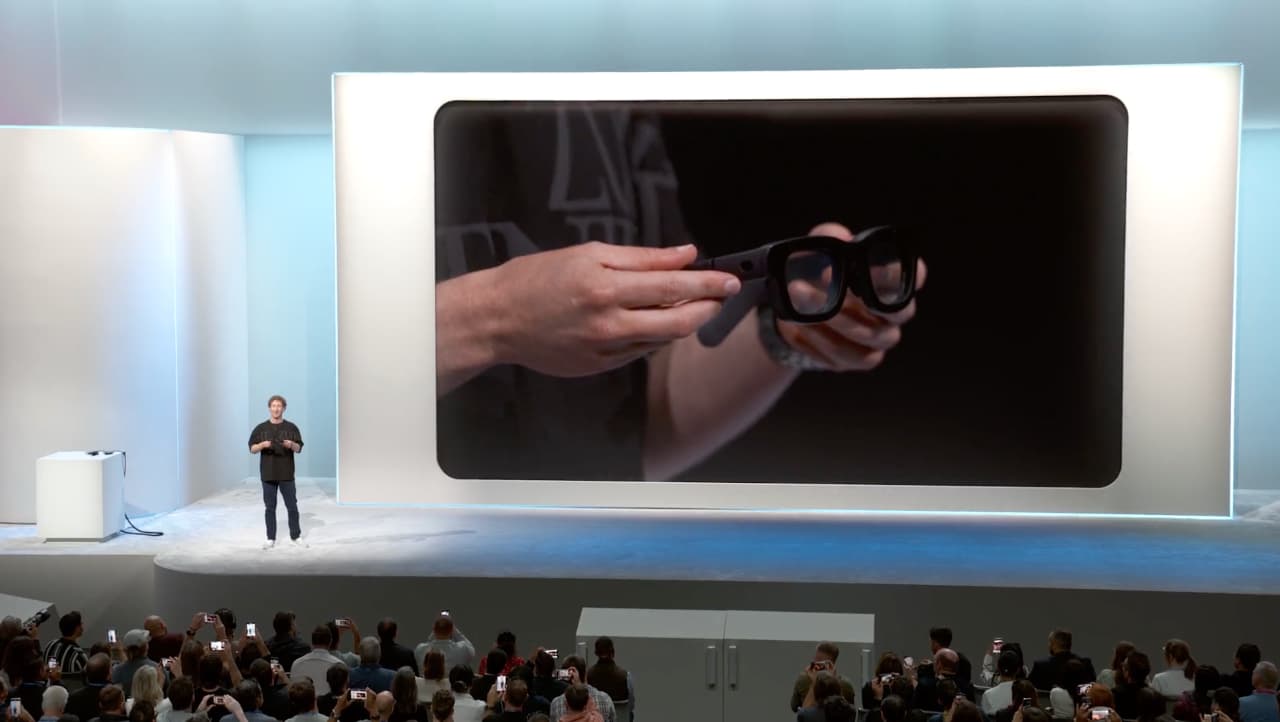
Both Meta, in the shape of a very front and centre Mark Zuckerberg, and Snap have released AR glasses in recent days. Neither are consumer products nor likely to be any time soon either.
Aut Caesar aut nihil is one of this interesting Latin phrases that can be translated several different ways. It’s literal meaning is ‘A Caesar or nothing’, in other words you need a ruler at the top or things fall apart, while its more colloquial meaning is ‘all or nothing’.
This was not quite the slogan emblazoned in large print on Meta CEO Mark Zuckerburg’s chest when he took to the stage at this week’s Meta Connect conference and unveiled, amongst other things, a prototype of the Orion AR glasses. He took it a step further: Aut Zuck aut nihil.

Without Zuck there is nothing? That's verging on Muskian. But if you were an investor in the company and had watched it pump tens of billions into the misfiring Reality Labs division in recent years, ‘nothing’ would probably help you sleep a bit sounder at night.
So, yes, we have a cheaper, crapper VR headset in the shape of the $299 Meta Quest 3S, and perhaps more temptingly the Quest 3 has shed $150 to come in at a $499 price point. We have some software updates to the breakout hit of the modern VR era to date the smart Ray-Bans that the WSJ reckons have shifted 700,000 units. And yes we have some new generative AI features coming to Facebook that no one asked for and seem solely designed to squeeze a few more bucks out of advertisers.
But it was Orion that was the centrepiece of the show. This, Zuck was saying, is the future.
Orion shall rise... eventually
If it is, then it’s not one a future that's coming any time soon. The earliest anyone is taking about Orion becoming a consumer device is 2027, and from where we’re sitting even that looks optimistic.
The glasses are lightweight at about 100g (3.53 oz), have a 70-degree field of view, a 2-hour battery life, and feature silicon carbide lenses coupled with Micro LED lenses. Seven cameras in the still fairly chunky frames map the real world onto your vision. They are only one component of a three-part set up too: a companion ‘neural wristband’ helps control the device and a deal of the computer power is offloaded to a wireless puck that needs to be kept in close proximity.

All of which sounds good on paper. The problem is that those lenses are hideously difficult to make - they were specced out as far back as 2018 and silicon carbide has failed to become as popular or as cheap to manufacture in the past six years at Meta had hoped. That means the failure rate is high. As a result, The Verge reports that the cost per unit of Orion is currently in the vicinity of $10,000.
If you’re making the Apple Vision Pro look cheap, then you’re on the wrong side of the equation.
As a result, the company is only making about 1000 of them for the developer community. And it is not the only company having difficulty here either. In a classic spoiler operation, Snap Inc. announced the fifth generation of its Spectacles AR glasses at the start of the week (below). It’s making 10,000 of these for developers, who can hire them for $99 a month on a year long commitment. They’re in a similar sort of ballpark to the Orion, but have a much narrower 46-degree diagonal field of view and a much shorter 45 minute battery life. Snap says a resolution of 37 pixels per degree is comparable to viewing a 100-inch display from 10 feet away. Again, no word on a release date, but the talk is of years and not months.

AR: Awaited Reality
The key takeaway from all this is that AR is hard. The Vision Pro is without doubt the cream of the current crop of AR / VR devices but has so many compromises handicapping it that it has to be considered a stepping stone to something smaller, lighter, and cheaper rather than a destination in itself. It has the wow factor other devices such as the Meta Quest lack sure, but so does a Ferrari over a Skoda and you don’t see many of Maranello’s finest out and about on the roads for a reason.
That the technology will get there is certain. When it will get there isn’t. And even a company such as Meta will have to do some fancy footwork if it wants to keep investors on board as it sinks another barrowload of billions into the development and manufacture of what will be truly next gen devices.
One other point is worth mentioning here too. Who do you trust to be the gatekeeper of your future augmented reality? Facebook’s current algorithms manipulate its newsfeed with the prime aim of maximising the company’s advertising revenue, and have been involved in some deeply shady practices in the past. Do you really want that same company having control over what you see in the everyday augmented world around you as well?
As the old saying goes, 'Render unto Caesar what is Caesar's'. The problem with Meta is always that Caesar wants as much of that everything as possible.
Tags: Technology AR Meta


Comments